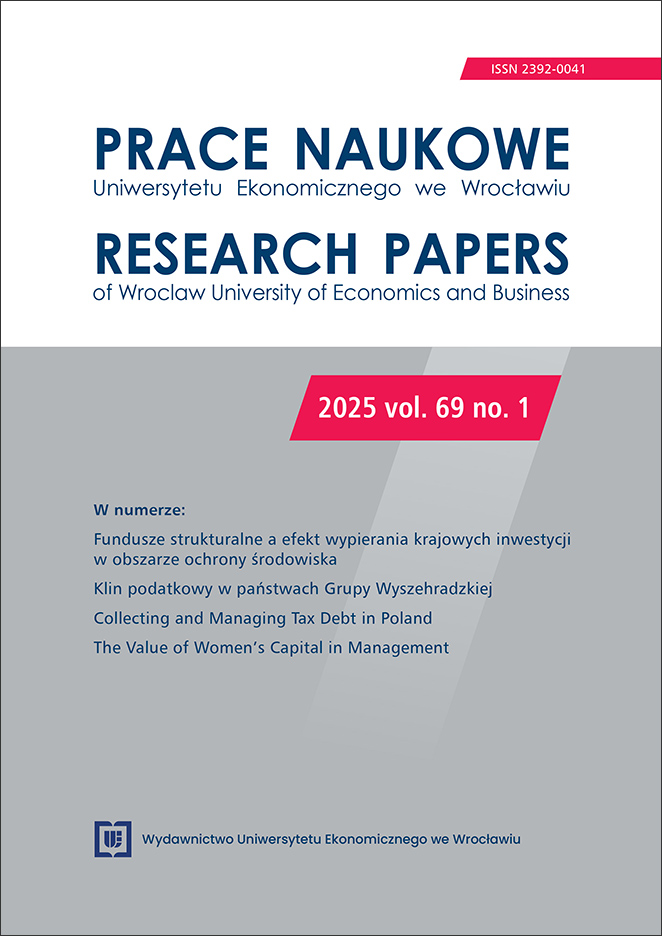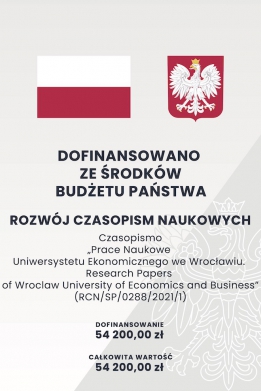The Value of Women’s Capital in Management: The Polish Perspective
DOI:
https://doi.org/10.15611/pn.2025.1.08Keywords:
gender equality, management, project management, Forbes Women PolskaAbstract
Aim: The aim of this paper is to demonstrate the value of women’s capital as a strategic asset in management and to trace the evolving attitudes toward gender equality in Poland over time.
Methodology: The study is based on a case study of the magazine Forbes Women Polska, an individual in-depth interview with an expert from the field, and an analysis of the Gender Equality Index (GEI) covering the years 2013–2024. This methodological triangulation ensures a comprehensive perspective on the issue.
Results: The findings highlight the significant benefits of maintaining gender equality in managerial positions, not only from an ethical perspective but also in terms of measurable advantages for firms and society. The study also reveals a gradual shift in public perceptions of gender roles in Poland, indicating increasing support for inclusive leadership.
Implications and recommendations: The paper suggests that prioritising gender equality is a strategic imperative for organizations aiming to unlock human potential, stimulate innovation, and ensure sustainable growth. Further research should continue to explore the socio-economic outcomes of gender-inclusive management practices.
Originality/value: This study provides a multidimensional insight into gender equality in Polish ma-nagement through the integration of qualitative and quantitative methods. It offers evidence-based support for viewing women’s capital as a key contributor to organizational and societal development.Downloads
References
Act of 5 January 2011 amending the Act – Electoral Ordinance for Municipal Councils, County Councils and Regional Assemblies, the Act – Electoral Ordinance for the Sejm and the Senate of the Republic of Poland, and the Act – Electoral Ordinance for the European Parliament [Ustawa z dnia 5 stycznia 2011 r. o zmianie ustawy – Ordynacja wyborcza...]. Journal of Laws, 2011, No. 34, item 172.
Babuchowska, K., Marks-Bielska, R., & Ostrowska, S. (2024). Conditions of Women Holding Management Positions in Poland. Economic and Regional Studies, 17(2), 270-289.
Baker, M., Ali, M., & French, E. (2019). The Impact of Women’s Representation on Performance in Project-Based and Non-Project-Based Organizations. International Journal of Project Management, 37(7), 872-883.
Caby, J., Coron, C., & Ziane, Y. (2024). How Does Gender Diversity in Top Management Teams Affect Carbon Disclosure and Its Quality: Evidence from the Technological Industry. Technological Forecasting and Social Change, 199, 123077. https://doi.org/10.1016/J.TECHFORE.2023.123077
Coe, I. R., Wiley, R., & Bekker, L. G. (2019). Organisational Best Practices towards Gender Equality in Science and Medicine. The Lancet, 393(10171), 587-593. https://doi.org/10.1016/S0140-6736(18)33188-X
Czerwińska, A., Łapniewska, Z., & Piotrowska, J. (n.d.). Kobiety na “zielonej wyspie”. Kryzys w Polsce z perspektywy gender.
Davidson, M. J., & Burke, R. J. (2012). Women in Management Worldwide: Progress and Prospects. Gower Publishing.
Dźwigoł-Barosz, M. (2016). Wpływ kobiet na biznes. Zeszyty Naukowe. Organizacja i Zarządzanie/Politechnika Śląska, 93,
129-140.
European Institute for Gender Equality. (2023). Poland. Gender Equality Index. https://eige.europa.eu/gender-equality-index/2023/PL
Eichelberger, W. (2005). Stres menedżerek. Home & Market, 2(151), 35-45.
Engeli, I., & Mazur, A. (2022). Gender Equality and Policy Implementation in the Corporate World: Making Democracy Work in Business. Oxford University Press.
ForbesWomen. (n.d.). Forbes – wiadomości gospodarcze i finansowe. https://www.forbes.pl/forbeswomen
Fuszara, M. (2017). Poland – A Success Story? Political History of Introducing Gender Quota in Post-Communist Poland. Teorija in Praksa, 54(2), 317.
Gaya, H. J. & Smith, E. E. (2016). Developing a Qualitative Single Case Study in the Strategic Management Realm: An Appropriate Research Design. International Journal of Business Management and Economic Research, 7(2), 529-538.
Gerber, A. (2010). The Letter versus the Spirit: Barriers to Meaningful Implementation of Gender Equality Policy in Poland. Women’s Studies International Forum, 33(1), 30-37. https://doi.org/10.1016/j.wsif.2009.11.007
Grzyb, M., Naudi, M., & Marcuello-Servós, C. (2018). Femicide definitions. In Femicide across Europe (pp. 17-32). Policy Press.
Iván, S. (2003). Bieda a nierówności płci i podziały etniczne w społeczeństwach postkomunistycznych. Wydawnictwo IFiS PAN.
Kark, R. & Eagly, A. H. (2010). Gender and Leadership: Negotiating the Labyrinth. Handbook of Gender Research in Psychology: Volume 2: Gender Research in Social and Applied Psychology, 443-468. Springer.
Kramer, M. (1995). Polish Workers and the Post-Communist Transition, 1989-1993. Communist and Post-Communist Studies, 28(1), 71-114. https://doi.org/10.1016/0967-067X(95)00002-C
Krook, M. L., & True, J. (2012). Rethinking the Life Cycles of International Norms: The United Nations and the Global Promotion of Gender Equality. European Journal of International Relations, 18(1), 103-127.
Lämsä, A., & Tiensuu, T. (2002). Representations of the Woman Leader in Finnish Business Media Articles. Business Ethics: A European Review, 11(4), 363-374.
Leszczyńska, M. (2018). Mandatory Quotas for Women on Boards of Directors in the European Union: Harmful to or Good for Company Performance? European Business Organization Law Review, 19(1), 35-61. https://doi.org/10.1007/s40804-017-0095-x
Lisowska, E. (2017). Quality of Life and Gender Equality: Some Conclusions from a Public Opinion Poll in Poland. In A. Brdulak, & H. Brdulak (Eds.), Happy City-How to Plan and Create the Best Liveable Area for the People (pp. 121-133). Springer International Publishing.
Mehraj, H. K., Bhat, A. N., & Mehraj, H. R. (2014). Impacts of Media on Society: A Sociological Perspective. International Journal of Humanities and Social Science Invention, 3(6), 56-64.
Melero, E. (2011). Are Workplaces with Many Women in Management Run Differently? Journal of Business Research, 64(4), 385-393.
Pięta-Szawara, A. (2015). Wpływ ustawy kwotowej na zakres podmiotowości politycznej kobiet w Polsce na przykładzie wyborów do Sejmu w 2011 roku oraz wyborów do Parlamentu Europejskiego w 2014 roku. Polityka i Społeczeństwo, 1(13), 36-45. https://doi.org/10.15584/polispol.2015.1.3
Post, C., & Byron, K. (2015). Women on Boards and Firm Financial Performance: A Meta-Analysis. Academy of Management Journal, 58(5), 1546-1571. https://doi.org/10.5465/amj.2013.0319
Power, K., Rak, L., & Kim, M. (2019). Women in Business Media: A Critical Discourse Analysis of Representations of Women in Forbes, Fortune and Bloomberg BusinessWeek, 2015-2017. Critical Approaches to Discourse Analysis Across Disciplines, 11(2).
Scott, L. M. (2021). Kapitał kobiet: dlaczego równouprawnienie wszystkim się opłaca. Wydawnictwo Filtry.
Siemieńska, R. (2008). Gender, Family, and Work: The Case of Poland in Cross-National Perspective. International Journal of Sociology, 38(4), 57-75. https://doi.org/10.2753/ijs0020-7659380403
Śledzińska-Simon, A. (2011). Zasada równości i zasada niedyskryminacji w prawie Unii Europejskiej. Studia BAS, 2, 41-86.
Tominc, P., Šebjan, U., & Širec, K. (2017). Perceived Gender Equality in Managerial Positions in Organizations. Organizacija, 50(2), 132-149. https://doi.org/10.1515/orga-2017-0009
United Nations. (2022). United Nations: Gender Equality and Women’s Empowerment. Retrieved from: https://www.un.org/sustainabledevelopment/gender-equality/
Васильченко М. А. Стиль как структурный элемент медиабренда. Вестник Санкт-Петербургского университета. Язык и литература. 2019, 16(4), 557–575. https://doi.org/10.21638/spbu09.2019.402
Watson, P. (1992). Gender relations, education and social change in Poland. Gender and Education, 4(1-2), 127-147. https://doi.org/10.1080/0954025920040109
Downloads
Published
License
Copyright (c) 2025 Aleksandra Szlachcic

This work is licensed under a Creative Commons Attribution-ShareAlike 4.0 International License.
Accepted 2025-02-08
Published 2025-05-28










